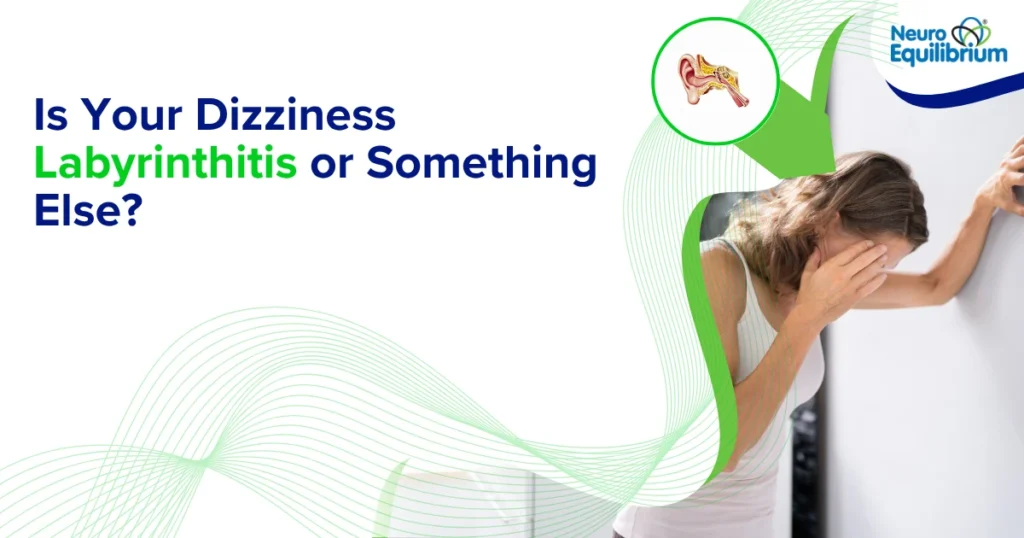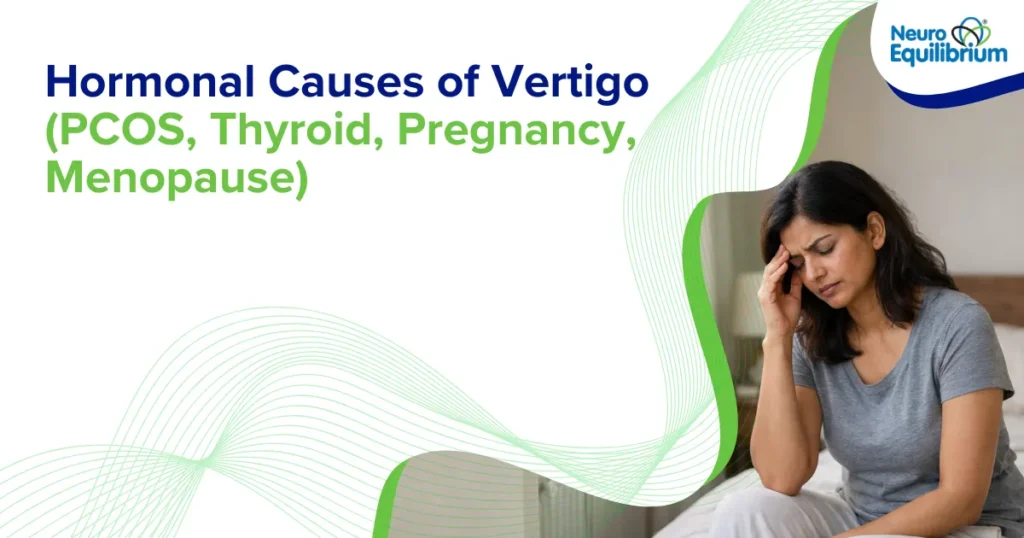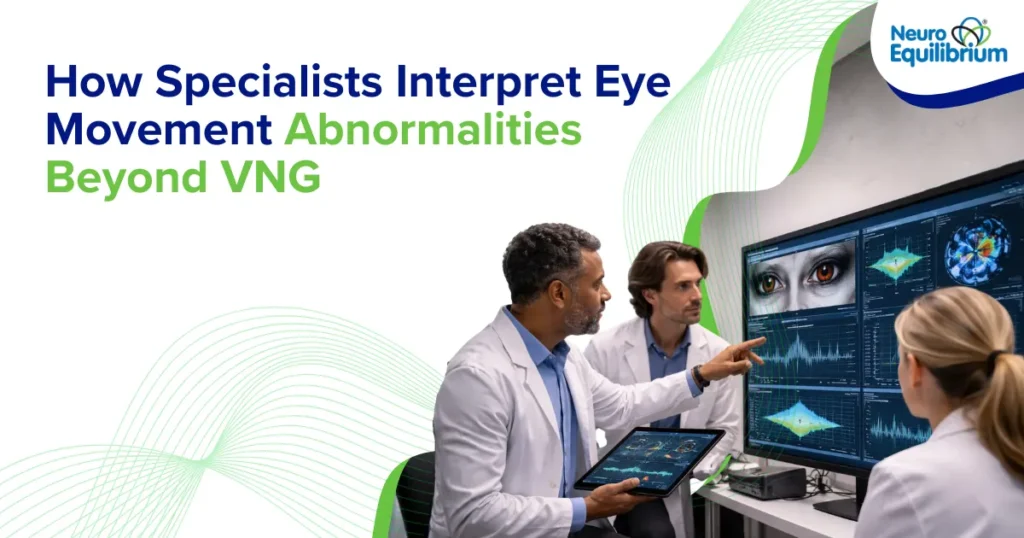Feeling dizzy can be unsettling, especially when you’re not sure why it’s happening. For some, it’s a fleeting sensation that passes quickly. For others, it can be more intense and make everyday activities difficult. The tricky part is that dizziness isn’t a diagnosis in itself. It’s a symptom that can come from many different causes, ranging from minor issues to conditions that need prompt medical care.
One possible cause is labyrinthitis, an inner ear condition that affects your balance. But it is far from the only explanation. In this blog, we’ll explain what labyrinthitis is, how it differs from other common causes of dizziness, and most importantly, how to know when it’s time to seek professional help to find the cause.
What Is Labyrinthitis?
Labyrinthitis is an inner ear disorder caused by an infection of the audio-vestibular nerve, which is responsible for both hearing and balance. This inflammation affects the entire inner ear, leading to a specific set of severe symptoms. If you have labyrinthitis, you’ll likely experience sudden, severe spinning (vertigo), nausea, and vomiting. You’ll also have trouble with your balance and might not be able to walk in a straight line. What makes labyrinthitis different from some other types of dizziness is that it often includes hearing loss or ringing in one ear. This condition frequently appears after you’ve had a viral infection like the flu, a cold, or even COVID-19. Because of the risk of permanent hearing loss, labyrinthitis is considered a medical emergency.
Know More About
- What Happens When Dizziness and Blurry Vision Come Together?
- Is It Anxiety or an Ear Problem?
- How to Find the Right Dizziness Doctor for You
Other Common Causes of Dizziness
As dizziness is a symptom of hundreds of various conditions, it can be useful to compare labyrinthitis to a couple of others. The following is a brief summary of some of the most frequent causes:
- Benign Paroxysmal Positional Vertigo (BPPV): It is characterized as one of the most frequent causes of vertigo. It entails brief, sharp bouts of spinning, less than one minute in length, that are precipitated by certain head movements, such as rolling over in bed or looking up. As opposed to labyrinthitis, BPPV does not lead to hearing loss.
- Vestibular Migraine: This type of migraine has dizziness as the primary symptom, and a headache may or may not appear. It may also make you hyper-sensitive to light and noise, with dizziness lasting from seconds to days. Unlike labyrinthitis, which is usually triggered by an ear infection, vestibular migraine does not originate in the inner ear but in the brain’s sensory processing pathways.
- Ménière’s Disease: This condition is characterized by periodic attacks of vertigo accompanied by hearing loss, tinnitus (ringing in the ears), and a sensation of fullness in one ear, caused by excess inner ear fluid pressure. In comparison, labyrinthitis typically causes sudden, continuous vertigo with hearing loss linked to infection, rather than repeated episodes over time.
- Anxiety or Panic Attacks: These can produce lightheadedness and a racing pulse but not the spinning sensation of vertigo. Unlike labyrinthitis, which is a physical inner ear disorder, dizziness from anxiety stems from the body’s stress response rather than a balance organ problem.
- Low Blood Pressure or Dehydration: Standing up too quickly or dehydration may lead to temporary lightheadedness. Labyrinthitis, on the other hand, causes prolonged vertigo due to inflammation of the inner ear, not changes in blood pressure or hydration.
- Neurological Conditions (e.g., Stroke, Multiple Sclerosis): These may trigger dizziness along with weakness, vision problems, or slurred speech. Unlike labyrinthitis, which primarily affects balance and hearing, neurological conditions often present with broader brain or nerve-related symptoms beyond vertigo.
How to Tell If It’s Labyrinthitis
Although only a doctor can provide you with a definite diagnosis, there are certain clues that may suggest labyrinthitis. Its dizziness is sudden, violent, and persistent rather than a momentary one with particular head movements. You will also experience changes in hearing, or other symptoms of the ears. Labyrinthitis is a condition that usually occurs after a viral infection and may take days or even weeks. It is also easily mistaken with BPPV, so keep in mind this one important distinction: BPPV attacks last a short period of time and are not associated with loss of hearing, whereas labyrinthitis episodes are longer and are related to alterations in your hearing.
| Symptom Feature | Labyrinthitis | Benign Paroxysmal Positional Vertigo (BPPV) |
| Dizziness Type | Sudden, severe, and continuous spinning (vertigo) | Brief, intense spinning |
| Duration | Lasts for days to weeks | Lasts for seconds (typically less than a minute) |
| Hearing Symptoms | Often includes hearing loss or tinnitus in one ear | No hearing loss or ear ringing |
| Trigger | Often follows a viral infection like a cold or flu | Triggered by specific head positions or movements |
| Associated Symptoms | Nausea, vomiting, and balance problems | Nausea may occur, but no hearing changes |
When Should You See a Specialist?
Since there are many conditions that may trigger dizziness, it is necessary to understand when one should seek medical attention. When dizziness is severe or persists longer than several days, you need to visit a specialist. When you have hearing loss, tinnitus, ear pain or you feel unsteady and are at the point you cannot walk straight, do not wait. You must also seek urgent medical care when your dizziness is associated with neurological symptoms such as slurred speech, numbness, or double vision. A specialist in dizziness should be able to diagnose the issue correctly and eliminate any serious disorders.
How NeuroEquilibrium Diagnoses the Cause
Due to the wide range of possible causes, an accurate diagnosis of dizziness is essential. At NeuroEquilibrium, our experts use a combination of procedures to identify the source of your dizziness. This includes a thorough patient history and a physical exam. We also perform specialized diagnostic tests to evaluate how your inner ear and brain are functioning. These may include VNG (Videonystagmography), vHIT (Video Head Impulse Test), and audiometry (hearing tests). Brain-related issues can be ruled out with MRI or CT scans in some cases. This detailed approach allows us to determine the cause of your symptoms and develop a personalized treatment plan.
Treatment Options for Labyrinthitis and Other Conditions
Identification of the right diagnosis is crucial since treatment of the condition is different. Early medical intervention is crucial in the case of labyrinthitis to avoid causing permanent hearing loss. The treatment usually involves high doses of steroids to curb the inflammation of the nerve, vestibular suppressants to curb the symptoms, and vestibular rehabilitation therapy (VRT) to make the brain regain balance. As labyrinthitis may also be a kind of medical emergency when accompanied by intense spinning and hearing loss on one side, early administration of steroid treatment is essential.
Specific exercises to improve body and gaze stability such as vestibular rehabilitation are important to recovery. VR Therapy (Virtual Reality Therapy) is available at NeuroEquilibrium to re-train the brain and body to adjust to dizziness and get better balance in the long run. Vestibular disorders not associated with BPPV (Benign Paroxysmal Positional Vertigo) will necessitate various treatments: canalith repositioning maneuvers to re-position displaced inner ear crystals in the case of BPPV; lifestyle modifications and prophylactic drugs in the case of vestibular migraine; and medication side effects or anxiety-related dizziness may require specific medical, therapeutic, or lifestyle interventions. The more effective diagnostic tests and targeted treatment plans offered by NeuroEquilibrium can effectively determine the cause of dizziness and provide more efficient treatment with a quicker recovery.
Conclusion: Don’t Ignore Dizziness
Dizziness can be unsettling and confusing, but remember, it has many possible causes. Not all are dangerous, though some require urgent and specific treatment. Getting the right diagnosis is key to receiving effective care. If you notice something’s wrong or your dizziness persists, trust your instincts and reach out to a specialist. The first step is to identify the root of the problem so you can regain your sense of stability and confidence.
If you’re unsure what’s causing your dizziness, our expert team at NeuroEquilibrium is here to help with advanced testing and personalized treatment options. Don’t hesitate to schedule a vestibular test with us.
Sources
- “Labyrinthitis and vestibular neuritis.” NHS. https://www.nhs.uk/conditions/labyrinthitis/ (nhs.uk)
- “Labyrinthitis and Vestibular Neuritis.” Johns Hopkins Medicine. https://www.hopkinsmedicine.org/health/conditions-and-diseases/labyrinthitis-and-vestibular-neuritis (Hopkins Medicine)
- Barkwill D. (2023). Labyrinthitis. StatPearls. https://www.ncbi.nlm.nih.gov/books/NBK560506/ (NCBI)
- “Vestibular neuritis.” StatPearls. https://www.ncbi.nlm.nih.gov/books/NBK549866/ (NCBI)
- “Vestibular neuritis & labyrinthitis — symptoms and treatment.” Patient.info. https://patient.info/signs-symptoms/dizziness/vestibular-neuritis-and-labyrinthitis-causes-and-treatment (Patient)
- “Inner Ear Balance (Vestibular) Disorders.” University of Chicago Medicine. https://www.uchicagomedicine.org/conditions-services/ear-nose-throat/ear-hearing-care/inner-ear-balance-disorders (uchicagomedicine.org)
How is labyrinthitis different from vestibular neuritis?
Labyrinthitis and vestibular neuritis are similar, but a key difference is that labyrinthitis affects both hearing and balance, while vestibular neuritis only affects balance, meaning there is no associated hearing loss.
Can stress cause dizziness?
Yes, dizziness or lightheadedness can certainly be caused by stress and anxiety but this is not usually the real spinning feeling of vertigo. It usually accompanies other symptoms such as racing heart and may be a component of panic attack.
How is BPPV treated?
A sequence of head and body movements carried out by a healthcare professional is usually used to treat BPPV. Such movements as Epley maneuver are aimed at returning the dislodged inner ear crystals into the right position.
Why do I need specialized tests for dizziness?
Dizziness has so many different causes that it is important to undergo specific tests such as VNG and vHIT to help accurately assess your inner ear and balance system. Such tests may allow obtaining objective data which can then allow a specialist to identify the exact cause of your symptoms and as a result, allow a better diagnosis and, therefore, a more effective treatment plan.
Can dietary changes help with dizziness?
In some conditions, yes. As an example, Meniere disease can be treated by lowering salt intake, and vestibular migraines can be treated by avoiding triggers such as caffeine and particular foods. In case of general dizziness, it is never bad to be hydrated.
















